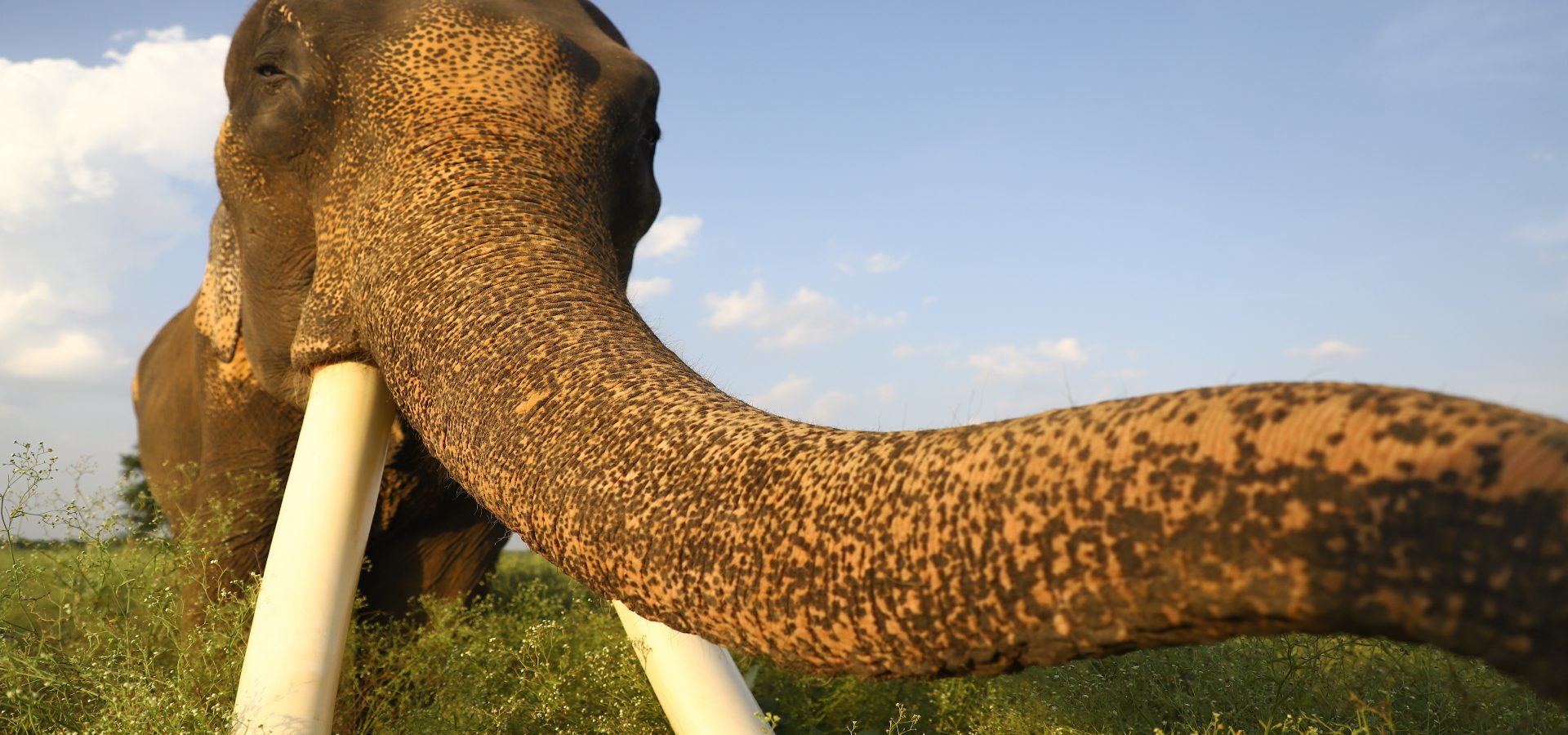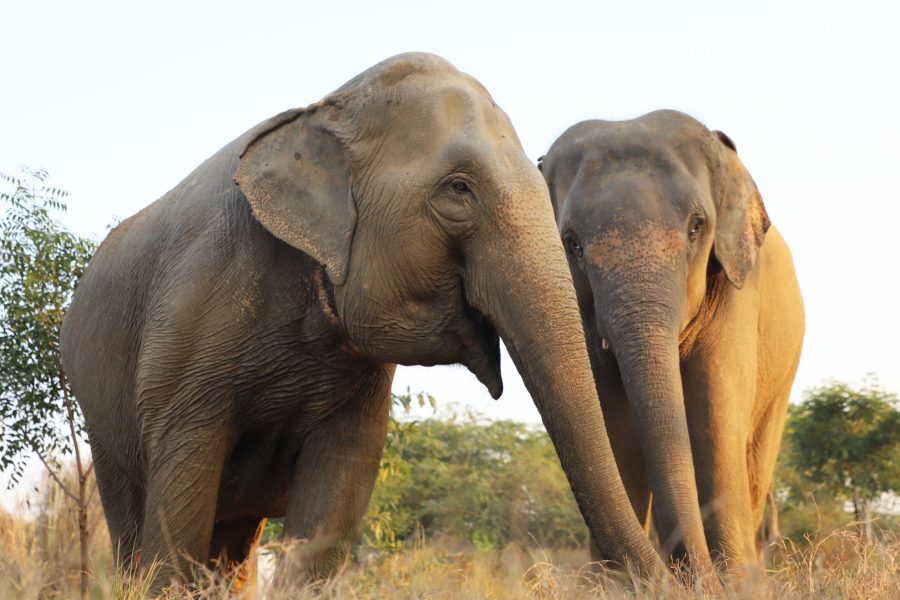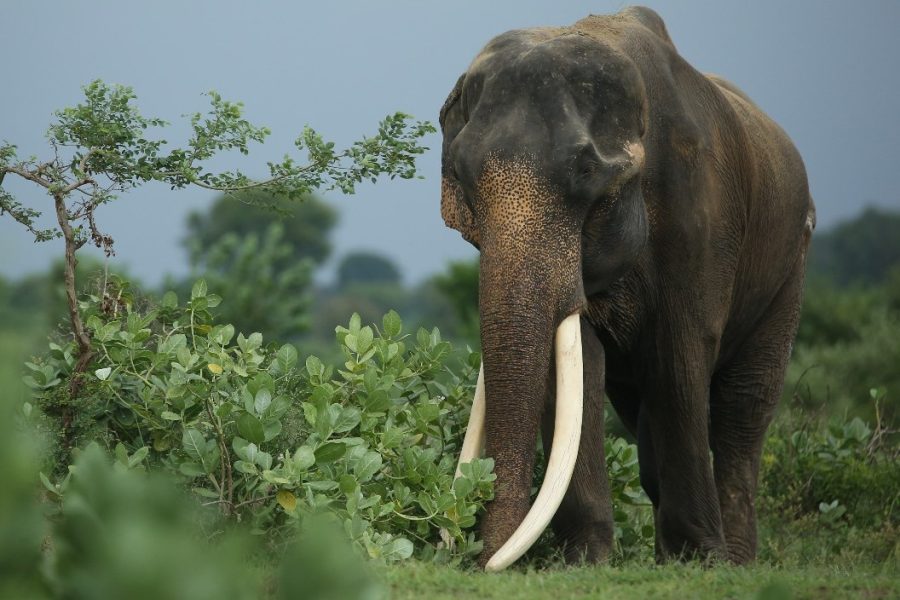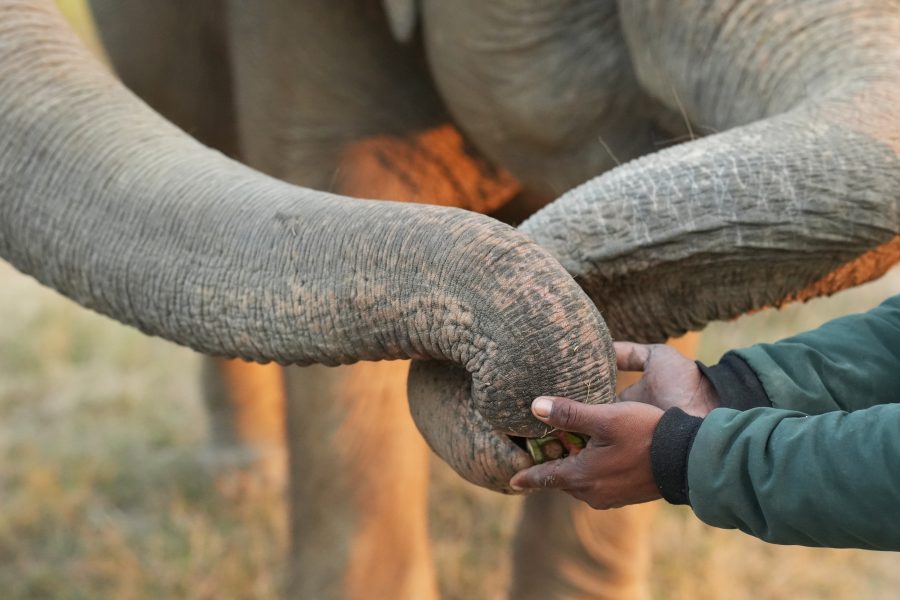Elephants rescued by Wildlife SOS have often endured a life marked by mistreatment, which leaves them emotionally and physically weak to express their natural behaviours. These experiences can lead to physical harm, trauma, fear, and even aggressive tendencies. Years of abuse leave lasting scars upon these elephants who often require long-term care and consistent medical aid to recuperate. When these elephants find refuge at Wildlife SOS, the rehabilitative care opens doors to psychological healing, social reconnection, and the freedom to express innate behaviours.
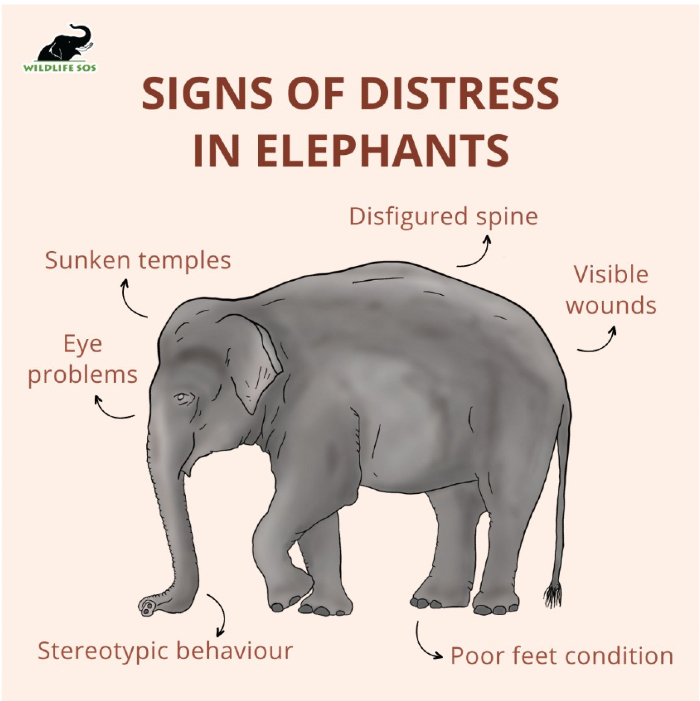
Caring for rescued elephants is a challenging yet fulfilling task. Their immense size, strength and intelligence test how well their surroundings are able to satisfy their needs. At Wildlife SOS, thorough research has been undertaken into the individual histories of rescued elephants in order to encourage optimal psychological and physical wellbeing. Through patient and compassionate interventions, Wildlife SOS enables these rescued elephants to rediscover their authenticity and embark on a journey of positive behavioural and physical change.
Emotional Healing and Trust Building
When elephants are rescued from hostility, they are found to be highly traumatised and distressed. Many endured years of abuse, and neglect, which leads to deep-seated fear, aggression, and withdrawal. At Wildlife SOS, the process of emotional healing and trust building begins by creating a safe and nurturing environment for the elephants. The caregivers spend time observing the elephants from a distance, giving them space to acclimate to their new surroundings. Over time, the elephants form strong bonds with their caregivers, who consistently provide them with nutritious diet, care, affection, and medical treatment.
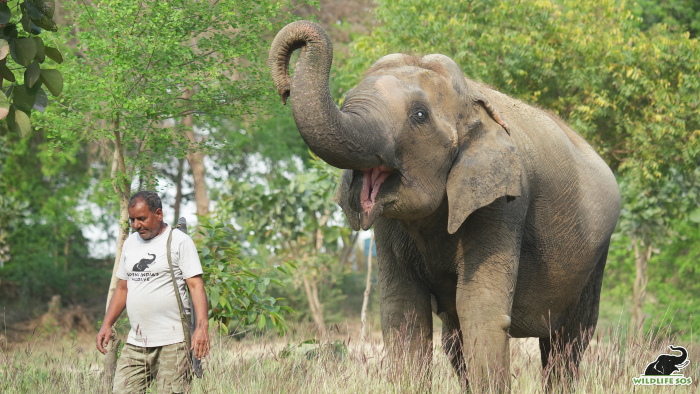
One such connection exists between Suzy, the oldest elephant at Wildlife SOS’ Elephant Conservation and Care Centre (ECCC) and her caregiver. Suzy had spent 65 years as a circus elephant before arriving at ECCC, performing dangerous tricks and living in dismal conditions inside the dingy tents of the circus. Suzy is blind in both eyes owing to the neglect she faced in her life. However, under the diligent supervision of her caregiver, Suzy blossomed into a personality that was unlike any other elephant at our centre. The true camaraderie between Suzy and her caregiver can be seen on their long evening walks through the topography of ECCC. As a blind elephant, Suzy entrusts her caregiver with her safety as she moves around the centre. With the tip of her trunk, Suzy makes sure that her caregiver is around, and sometimes even refuses to budge if she cannot sense her companion right beside her!
Natural Foraging and Enrichments
Under the care of Wildlife SOS, elephants regain the opportunity to engage in natural foraging behaviours that encourage both physical exercise and cognitive stimulation. The caregivers of Wildlife SOS offer a variety of vegetation and fruits for elephants to explore and consume throughout the day. They carry these goodies during their daily walks with elephants too!
At ECCC, the caregivers also use enrichments as one of the key ways of helping our rescued elephants heal from their traumatic pasts through the stimulation of behaviours that are natural and instinctive to them. With the double benefit that propels elephants to exercise their body and mind in order to obtain their food, enrichments play a vital role in helping our elephants to become elephants again. Interacting with enrichments stimulates problem-solving abilities and promotes mental engagement.
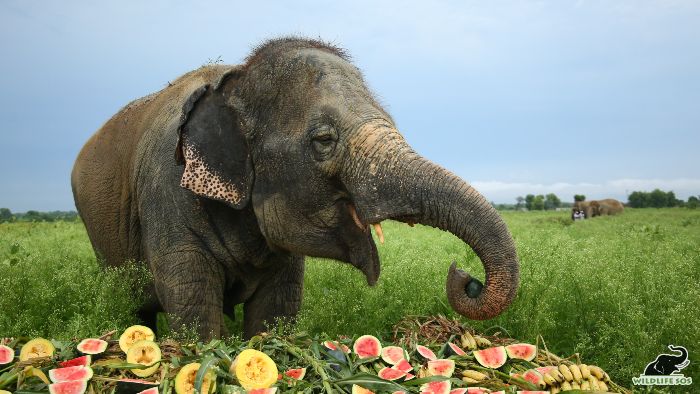
Wildlife SOS creates enrichment activities like puzzle feeders and rubber tyre toys for elephants that activate their senses and creative stimuli. Engaging with these alleviates stress, combats boredom, and facilitates the expression of innate behaviours of elephants.
The importance of these enrichments is evident through Laxmi, another rescued elephant at ECCC, whose story exemplifies remarkable transformation. When rescued, Laxmi had severe osteoarthritis and aching limbs due to her obesity caused by the routine consumption of sweets and fried foods.
Laxmi’s caregivers knew that her weight required careful management as they transitioned her from unhealthy, junk food to a balanced diet rich in green vegetables and fodder. Laxmi’s healing journey also included daily walks and exercises. To entice her to continue walking, tempting treats like dates and green cherries were offered to her along the way. Laxmi being the fun-loving and playful pachyderm, is always up to some or the other tactic to earn a few extra treats from her caregiver. She has learnt that if she opens the knots of her haynet enrichment that keep her food suspended, everything will fall down at once and will be much easier to eat!
Socialisation and Herd Dynamics
Social connections are a crucial aspect of an elephant’s wellbeing. After undergoing health assessments, rescued elephants at Wildlife SOS are introduced to their enclosures and the neighbouring elephants. These introductions are closely monitored to ensure positive interactions between elephants and the gradual formation of bonds. As elephants spend time together, they engage in natural social behaviours, fostering a sense of belonging and emotional security. The supportive herd environment enables them to rediscover the joy of grooming, and playing, ultimately leading to psychological comfort.
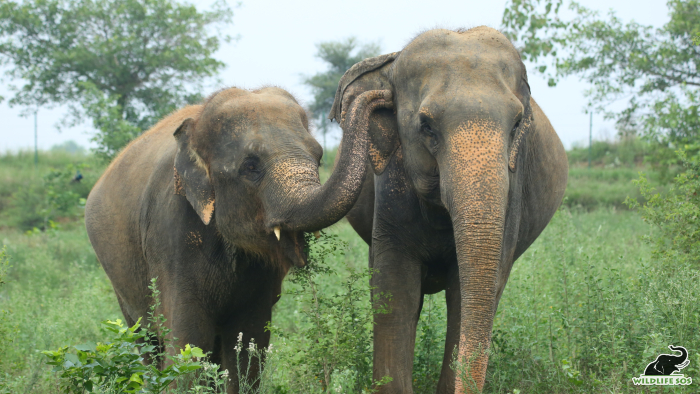
In the wild, elephants live in tight-knit family groups called herds. These herds are characterised by strong social links and cooperative behaviours that promote the wellbeing of individual elephants. However, when poached from the wild, elephant calves are separated from their families and are kept in isolation, leading to social deprivation and loneliness.
The heartwarming story of the companionship of Arya and Zara, two rescued elephants at Wildlife SOS, is a prime example of how elephants can thrive in the company of a lifelong friend.
Separated from her mother at a young age, Zara‘s life was one of harsh servitude for two decades. Enduring abuse and neglect, she walked on scorching surfaces under the lash of a bullhook, leading to emaciated limbs and serious osteoarthritis. Zara was rescued and rehabilitated by Wildlife SOS in the year 2020, and soon after her arrival at the centre, the pachyderm found companionship in Arya, another rescued elephant at Wildlife SOS. Like Zara, Arya had suffered the horrors of human cruelty as a begging elephant. Zara’s profound empathy shone when she extended her trunk to comfort Arya, who is blind. Even now during their walks, Zara’s vigilant trumpets guide Arya, showcasing the trust they have formed after going through shared struggles. Arya now navigates her world with the help of her beloved companion Zara. In each other, Zara and Arya have discovered not only friendship, but also an unspoken language of empathy that transcends their individualities.
Expression of Natural Behaviours
In their past lives of abuse, elephants are often limited in their movements and expressions, which can lead to frustration and mental discomfort. Elephants are highly intelligent animals and a lack of stimulation is particularly detrimental, leading to numerous abnormal stereotypic behaviours, such as repetitive head-bobbing, weaving, swaying, and walking over the same set path or in a circle.
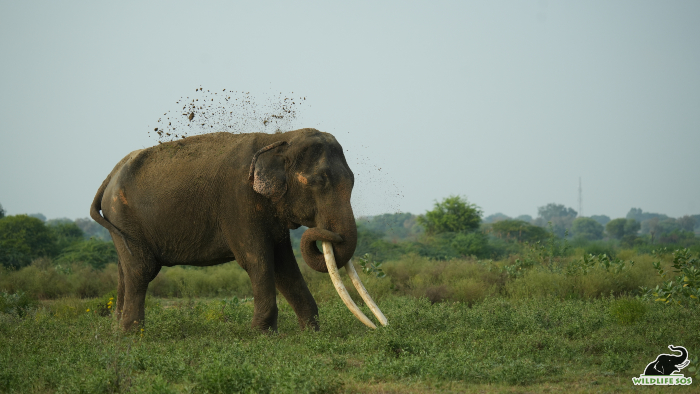
As the rescued elephants settle into their new environment at Wildlife SOS, they reveal their true selves by indulging in their natural behaviours. Dust bathing and mud wallowing are some of the examples of these behaviours. An elephant’s healing is also indicated when it becomes more vocal, emitting various sounds like trumpeting, rumbling, and growling, which are essential communication tools in the wild.
Suraj, a bull elephant, rescued by Wildlife SOS in 2015, lived in a confined, dark and damp temple, with little food and water. Suraj had also lost his left ear, presumably during the separation from his herd as a young calf. When Suraj first arrived at ECCC, he was extremely anxious and flinched at every little noise. He would display stereotypic behaviours such as swaying and head-bobbing whenever he felt stressed.
He flinched and became anxious with every noise he heard, and rain and thunder would terrify him. All these were trauma responses from the tortures he had faced up until the rescue. Under the gentle care of his caregiver at Wildlife SOS, Suraj began a journey towards healing. With time, his anxieties began to wane. He embraced cool showers, relishing the sensation of water cleansing his weary body.
The remarkable transformation of rescued elephants at Wildlife SOS serves as a powerful example of the profound impact of compassionate care and renewed purpose through the continuous efforts of dedicated caregivers. Developing a bond of trust with the caregivers plays a crucial role for the wellbeing of the elephants as these rescued pachyderms had known a life of confinement and loneliness. The journey involves overcoming trauma, rebuilding trust, and embracing an interactive environment amongst the elephants. The heartwarming stories of elephants like Suzy, Laxmi, Zara, Arya, and Suraj highlight the resilience of these animals and the profound bond that can form between them and their caregivers.
You can help the resident elephants of Wildlife SOS continue their journey towards healing and transformation by donating here.

